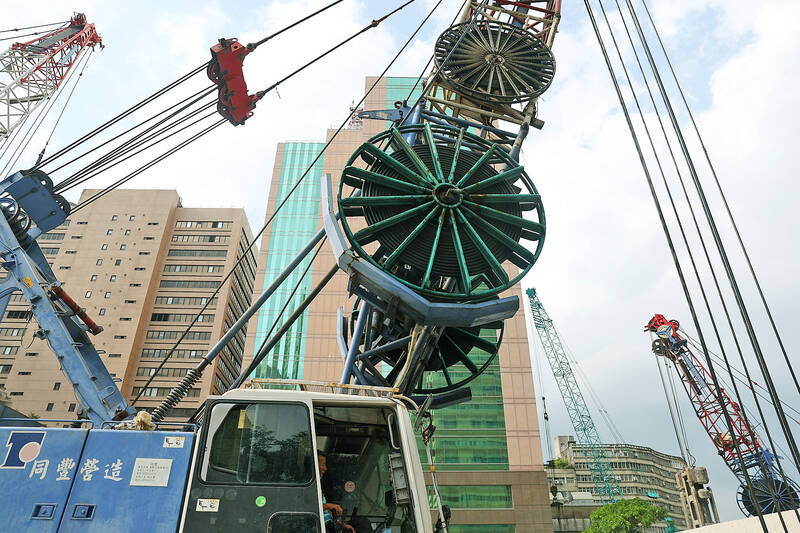Taiwan’s economy would probably grow more slowly this year than previously forecast, the government’s statistics office said yesterday, as weakening global demand weighs heavily on its key technology exports.
Taiwan, home to major tech companies including the world’s largest contract chip maker, Taiwan Semiconductor Manufacturing Co (TSMC, 台積電), has seen its exports contracting amid interest rate hikes around the world in response to rising inflation and growing US-China trade tensions.
Export orders slipped for an eighth straight month last month and missed forecasts.

Photo: CNA
The nation’s GDP is expected to expand 2.04 percent in 2023 from last year, the Directorate-General of Budget, Accounting and Statistics (DGBAS) said, revising down its earlier 2.12 percent growth forecast.
The economy is likely to grow at the slowest pace since 2015, the DGBAS said.
First-quarter GDP fell by a revised 2.87 percent year-on-year versus a preliminarily forecast 3.02 percent fall, the agency said, the worst performance since 2009.
“First-quarter inventory adjustment was very obvious,” DGBAS deputy head Tsai Hung-kun (蔡鴻坤) told reporters, adding that the adjustment was NT$50.5 billion (US$1.64 billion) in the fourth quarter last year, followed by NT$24.4 billion in the first quarter this year, a declining trend that is expected to continue in the second quarter.
“Although the economic growth was negative, domestic demand performed pretty well,” Tsai said, adding that unemployment was at its lowest in more than two decades.
The DGBAS now sees exports this year falling 7.27 percent from last year, compared with a 5.84 percent slide predicted earlier.
Private consumption in Taiwan grew 6.5 percent in the first three months of this year, yesterday’s updated figures showed, gains that were largely offset by a 3.2 percent drop in investments.
As a result, domestic demand was not able to counteract the 10.8 percent drop in exports.
Weak overseas demand for Taiwanese semiconductors pushed export orders down for an eighth consecutive month last month, undermining growth in the trade-dependent economy, while uncomfortably high inflation led the central bank to raise its key interest rate for the fifth consecutive time in March.
The higher borrowing costs also risk piling pressure on Taiwan’s homebuilders, as well as homebuyers and consumers, who have been hit by higher mortgage costs and higher prices for everyday goods.
Taiwan’s economy has slipped into recession after contracting for two quarters in a row and central bank Governor Yang Chin-long (楊金龍) warned this week that it might not rebound until the fourth quarter.
Yang on Wednesday said that policymakers would weigh inflation and economic growth when making their next interest rate decision on June 15.
The bank has raised rates five times since March last year.
The DGBAS also revised upward Taiwan’s inflation outlook for this year to 2.26 percent, versus a previous forecast of 2.16 percent.

Nvidia Corp’s demand for advanced packaging from Taiwan Semiconductor Manufacturing Co (TSMC, 台積電) remains strong though the kind of technology it needs is changing, Nvidia CEO Jensen Huang (黃仁勳) said yesterday, after he was asked whether the company was cutting orders. Nvidia’s most advanced artificial intelligence (AI) chip, Blackwell, consists of multiple chips glued together using a complex chip-on-wafer-on-substrate (CoWoS) advanced packaging technology offered by TSMC, Nvidia’s main contract chipmaker. “As we move into Blackwell, we will use largely CoWoS-L. Of course, we’re still manufacturing Hopper, and Hopper will use CowoS-S. We will also transition the CoWoS-S capacity to CoWos-L,” Huang said

Nvidia Corp CEO Jensen Huang (黃仁勳) is expected to miss the inauguration of US president-elect Donald Trump on Monday, bucking a trend among high-profile US technology leaders. Huang is visiting East Asia this week, as he typically does around the time of the Lunar New Year, a person familiar with the situation said. He has never previously attended a US presidential inauguration, said the person, who asked not to be identified, because the plans have not been announced. That makes Nvidia an exception among the most valuable technology companies, most of which are sending cofounders or CEOs to the event. That includes

INDUSTRY LEADER: TSMC aims to continue outperforming the industry’s growth and makes 2025 another strong growth year, chairman and CEO C.C. Wei says Taiwan Semiconductor Manufacturing Co (TSMC, 台積電), a major chip supplier to Nvidia Corp and Apple Inc, yesterday said it aims to grow revenue by about 25 percent this year, driven by robust demand for artificial intelligence (AI) chips. That means TSMC would continue to outpace the foundry industry’s 10 percent annual growth this year based on the chipmaker’s estimate. The chipmaker expects revenue from AI-related chips to double this year, extending a three-fold increase last year. The growth would quicken over the next five years at a compound annual growth rate of 45 percent, fueled by strong demand for the high-performance computing

TARIFF TRADE-OFF: Machinery exports to China dropped after Beijing ended its tariff reductions in June, while potential new tariffs fueled ‘front-loaded’ orders to the US The nation’s machinery exports to the US amounted to US$7.19 billion last year, surpassing the US$6.86 billion to China to become the largest export destination for the local machinery industry, the Taiwan Association of Machinery Industry (TAMI, 台灣機械公會) said in a report on Jan. 10. It came as some manufacturers brought forward or “front-loaded” US-bound shipments as required by customers ahead of potential tariffs imposed by the new US administration, the association said. During his campaign, US president-elect Donald Trump threatened tariffs of as high as 60 percent on Chinese goods and 10 percent to 20 percent on imports from other countries.